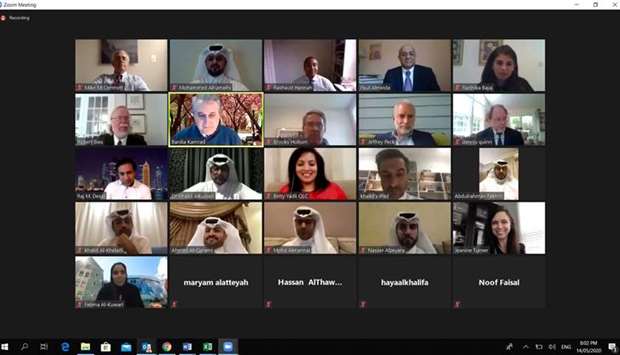Qatar Leadership Centre (QLC) participants in the Georgetown University Executive Master’s in Leadership - Qatar (EML-Q) programme have presented their final capstone projects, using online digital tools, to McDonough School of Business faculty members and guests from the QLC management, both attending remotely.
QLC switched to online digital learning in early-March in order to align with official health and safety measures to combat Covid-19, with students and faculty quickly adapting to the challenge.
HE Sheikh Dr Abdulla bin Ali al-Thani, vice-chairperson of the QLC Board of Directors and managing director, emphasised that “the health and safety of students, faculty and staff in our learning environment remains a top priority”. He noted, “During this unprecedented global challenge, we are especially proud of our students’ dedication and level of achievement, and greatly appreciate the flexibility and exceptional efforts of the Georgetown faculty as well as the guidance and support of Qatar’s health authorities.”
EML-Q is a unique graduate programme offered exclusively to alumni of the QLC National Leadership Programmes. Among the class are experienced Qatari executives and decision-makers from across government, public and private sectors.
The programme integrates practical management skills and advanced leadership theory to enable participants to understand and engage in positive transformation in their professional engagements, to better serve society, QLC has said in a statement.
As part of the curriculum, students are expected to complete a six-month capstone project on a sector of importance to the country, such as health, sports, finance, environment, logistics, hospitality, and oil and gas. Students are grouped randomly into teams of four, to facilitate cross-sectoral collaboration and demonstrate learning outcomes of the programme.
Fatima Sultan al-Kuwari, an EML-Q student with 14 years’ experience in telecommunications, worked collaboratively in a group to study the correlation between Qatar’s investment in fitness initiatives and physical activity and its impact on reducing obesity rates in Qatar.
Commenting on the project, al-Kuwari said: “The capstone project offered valuable opportunities to research a topic outside of our own sectoral experience, and brought us in touch with Qatar’s healthcare experts on a critical topic area.” She cited “the positive effect” of the graduate programme “on our personal and professional lives”, with its exposure to “the benefits and importance of true leadership”.
QLC and Georgetown worked together to transition to online learning, and students were required to finish the second half of their capstone projects using digital platforms. Professors continued to lend support and guidance through video conferencing tools and adjusted schedules as needed to support learning requirements.
“The capstone project provides an opportunity for future leaders to systematically craft an implementable strategy on a topic of importance for the future of Qatar,” said Dr Bardia Kamrad, senior associate dean for Executive Degree Programmes at Georgetown’s McDonough School of Business.
“The students assembled thoughtful, innovative and results-oriented solutions to real problems, and it is our sincere hope that their leadership in these areas will enhance innovation further for Qatar.”
One aim of the graduate programme is to broaden student exposure to effective leadership in service of community as well as society. Engineer Nasser Ahmed Alzeyara, with 10 years’ experience in education and training in the government sector, worked in a group to study the effects of Covid-19 and geopolitics on Qatar’s sports tourism, given Qatar’s growing prominence in recent years in the field of sports regionally and internationally.
Alzeyara noted the graduate programme explored “tangible challenges of leadership and the importance of innovative analysis in problem-solving” and enhanced an understanding of “how leaders within an organisation must be able to effectively adapt their strategy and goals.” He found the coursework “unique in many ways”, and saw that the modules complement a long-term national development strategy.
Despite the challenges of online learning, Alzeyara said the programme “helped me connect with people from different backgrounds and communities, even if digitally”.

A visual from an online session.
